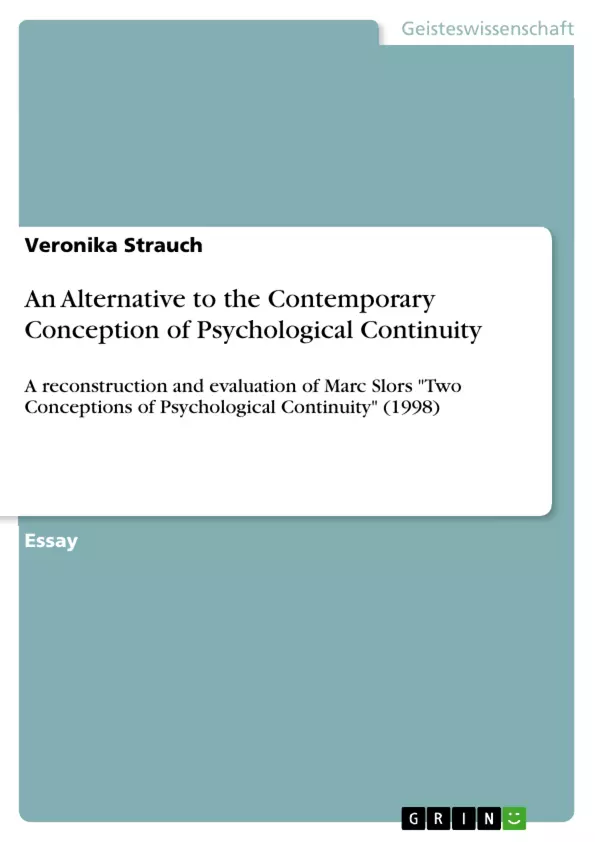This essay refers to Marc Slors “Two Conceptions of Psychological Continuity” (1998) in which he develops and defends a conception of psychological continuity based on the partial dissolution of a psychological criterion, a body criterion and an interpretation of the psychological continuity criterion about personal identity across time.
This essay focuses on three topics, that have been the most outstanding observations by Slors in the text: the third-person criterion, connectedness of perceptual contents and narrative connectedness between particular psychological contents. It ends with an own evaluation about Marc Slors and his point of view on Personal Identity across time.
Inhaltsverzeichnis
- An Alternative to Contemporary Conception of Psychological Continuity
- The third-person criterion
- Connectedness of perceptual contents
- Narrative connectedness between particular psychological contents
Zielsetzung und Themenschwerpunkte
Dieser Essay befasst sich mit Marc Slors' "Two Conceptions of Psychological Continuity" (1998), in dem er eine Konzeption psychologischer Kontinuität entwickelt und verteidigt, die auf der teilweisen Auflösung eines psychologischen Kriteriums, eines Körperskriteriums und einer Interpretation des psychologischen Kontinuitätskriteriums über die persönliche Identität im Laufe der Zeit basiert.
- Rekonstruktion der Argumentation von Marc Slors
- Analyse des dritten Personen Kriteriums
- Bedeutung der Vernetzung von wahrnehmungsbezogenen Inhalten
- Narrative Vernetzung zwischen psychologischen Inhalten
- Bewertung der Argumentation von Slors
Zusammenfassung der Kapitel
An Alternative to Contemporary Conception of Psychological Continuity
Slors argumentiert, dass es eine Alternative zur zeitgenössischen Konzeption psychologischer Kontinuität gibt, die einige, aber nicht alle, Intuitionen hinter dem Körperskriterium und einige, aber nicht alle, Intuitionen hinter der Ego-Theorie integriert. Er präsentiert fünf Kernaussagen, die seine Argumentation stützen.
The third-person criterion
Slors kritisiert, dass kausal verbundene Gehirnzustände, die von einem dritten Standpunkt aus zugänglich sind, kein vollständiges Reidentifikationskriterium liefern, da die Inhalte der mentalen Zustände "von außen" bestimmt werden müssten, was nicht möglich ist. Er stellt eine Alternative vor, die sowohl Kriterien für die Reidentifikation von außen zulässt, als auch ein genaueres Kriterium für die Bestimmung, ob eine radikale psychologische Veränderung mit der transtemporalen persönlichen Identität vereinbar ist.
Connectedness of perceptual contents
Slors vertritt die Meinung, dass die Vernetzung von verschiedenen Inhalten eine Form der psychologischen Vernetzung darstellt, die sich von der Vernetzung zwischen qualitativ ähnlichen Inhalten, wie z. B. Erfahrungen und Erinnerungen, unterscheidet. Er argumentiert, dass jede Wahrnehmung zu einem bestimmten Zeitpunkt durch das "gesamte verständliche Bild der Umgebung des wahrnehmenden Körpers, das sie zeichnen, mit früheren und nachfolgenden Wahrnehmungen verbunden ist".
Narrative connectedness between particular psychological contents
Slors unterscheidet zwei Arten der psychologischen Vernetzung: die qualitative Ähnlichkeit von Inhalten und die narrative Vernetzung. Er bezeichnet die qualitative Ähnlichkeit als P-Vernetzung (P für "Preservation") und die narrative Vernetzung als N-Vernetzung (N für "Narrativity"). Narrative Vernetzung wird als Verbindung zwischen "festen Dingen", d. h. zwischen bestimmten psychologischen Inhalten, beschrieben.
Schlüsselwörter
Psychologische Kontinuität, Persönliche Identität, Drittes Personen Kriterium, Narrative Vernetzung, Wahrnehmungsbezogene Inhalte, Ego-Theorie, Körperskriterium, Qualitative Ähnlichkeit, Reidentifikation.
Häufig gestellte Fragen
Was ist Marc Slors' Kritik am herkömmlichen psychologischen Kontinuitätskriterium?
Slors argumentiert, dass die rein kausale Verbindung von Gehirnzuständen nicht ausreicht, um persönliche Identität zu erklären, da sie die subjektive Bedeutung mentaler Inhalte vernachlässigt.
Was versteht man unter dem „Dritt-Personen-Kriterium“?
Es bezeichnet die Reidentifikation einer Person durch Beobachtung von außen. Slors zeigt auf, dass dieses Kriterium allein nicht ausreicht, um radikale psychologische Veränderungen zu bewerten.
Was ist der Unterschied zwischen P-Vernetzung und N-Vernetzung?
P-Vernetzung (Preservation) bezieht sich auf die qualitative Ähnlichkeit von Inhalten (z. B. Erinnerungen), während N-Vernetzung (Narrativity) die narrative Verknüpfung verschiedener psychologischer Inhalte beschreibt.
Wie hängen Wahrnehmungsinhalte mit der Identität zusammen?
Slors postuliert, dass Wahrnehmungen durch ein „verständliches Bild der Umgebung“ miteinander verbunden sind, was eine Form der psychologischen Kontinuität jenseits bloßer Erinnerungen darstellt.
Warum integriert Slors Teile des Körperkriteriums in seine Theorie?
Er glaubt, dass eine rein psychologische Sichtweise unvollständig ist und dass die physische Präsenz des Körpers eine notwendige Basis für die Einordnung mentaler Zustände bietet.
- Arbeit zitieren
- Veronika Strauch (Autor:in), 2020, An Alternative to the Contemporary Conception of Psychological Continuity, München, GRIN Verlag, https://www.grin.com/document/1309749



